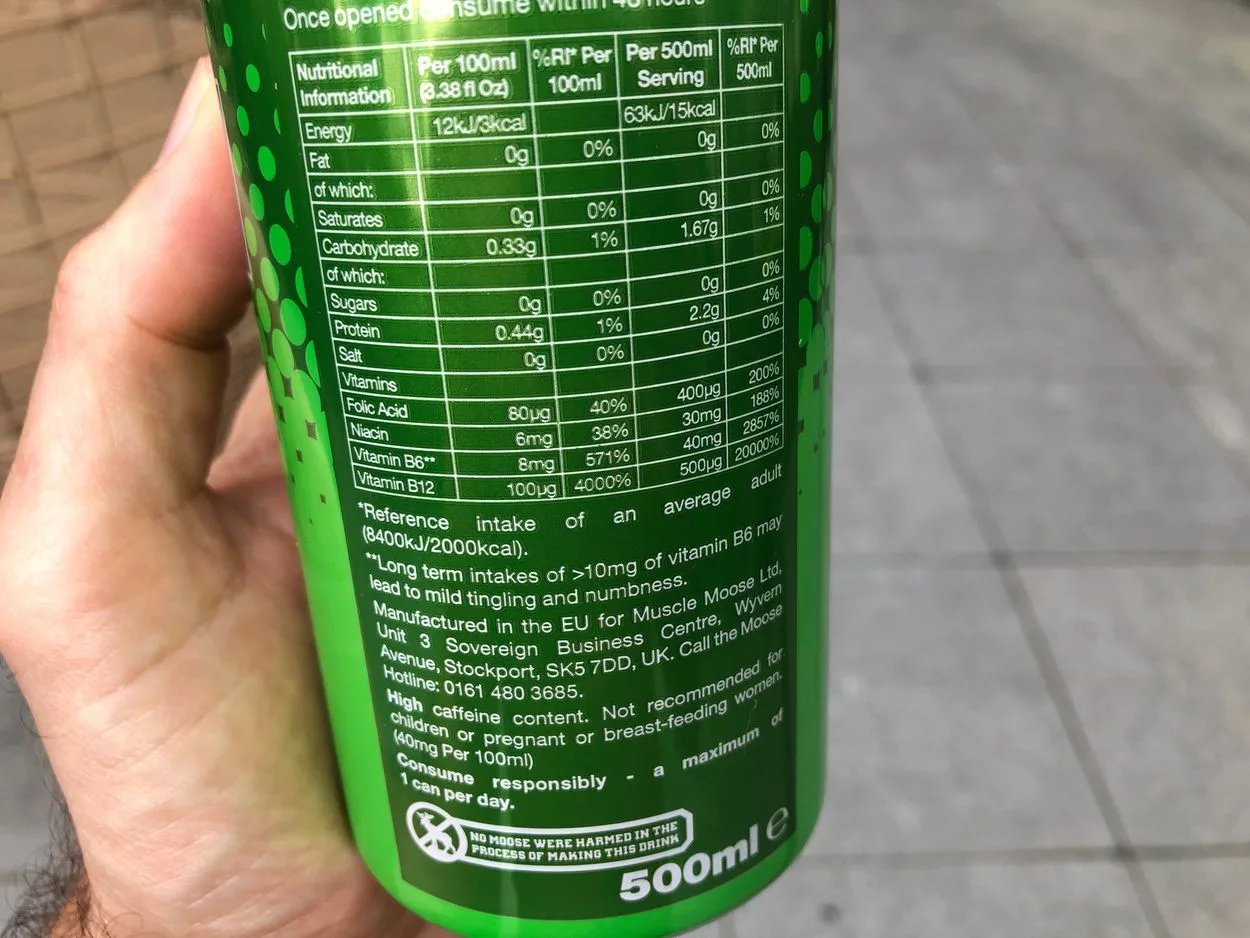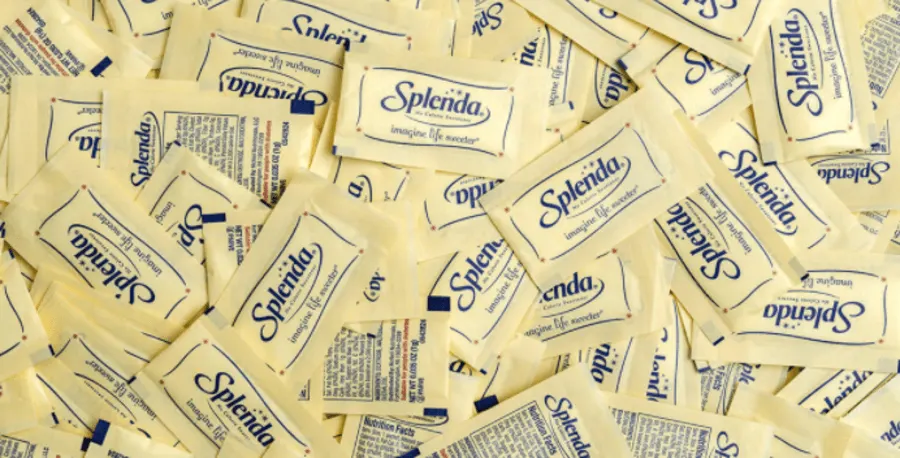Moose Juice is a popular energy drink brand largely sold in the United Kingdom and Ireland.
The drink comes with several essential B-Vitamins, 200mg of caffeine and 15 calories in every 500mL can.
The 200mg of caffeine is substantial enough to give you an energy boost and it surely doesn’t hurt that it contains no sugar, fat, and has a low calorie count too!
Read on for a deep dive into the details of various other ingredients included in Moose Juice.
Contents
What are the Ingredients of Moose Juice Energy Drink?
Moose Juice comes packed with the following ingredients.
- Carbonated water
- D-Glucuronolactone
- Branch Chain Amino Acids (Leucine, Isoleucine, Valine)
- Taurine
- Caffeine anhydrous
- L-Tyrosine
- L-Carnitine
- L-Tartrate
- Pyridoxine Hydrochloride (Vitamin B6)
- Nicotinamide (Niacin)
- Sucralose (Artificial sweetener)
- Cholin Bitartate
- Acesulfame Potassium (Artificial sweetener)
- Cyanocobalomin (Vitamin B12)
- Folic Acid
- Flavourings
- Malic Acid (Acidity regulators)
- Citric Acid (Acidity regulators)
Nutritional Facts of Moose Juice
Here’s a handy guide to the essential ingredients present in Moose Juice.
| Ingredient | Amount Per 500mL |
| Total Fat | 0g |
| Total Carbohydrate | 1.67g (1%) |
| Sugar | 0g |
| Protein | 2.2g (4%) |
| Folic Acid | 400mcg (200%) |
| Vitamin B3 | 30mg (188%) |
| Vitamin B6 | 400mg |
| Vitamin B12 | 500mcg |
| Calories | 15 |
| Caffeine | 200mg |

Vitamins in Moose Juice
Like most other energy drinks, Moose Juice contains several B Vitamins, which give the energy drink its properties and provide other benefits.
| Vitamin | Benefit | Amount in Moose | Daily Advised Limit |
| Vitamin B3 | Boosts Brain Function | 30mg | 16.5mg – Men 12.2mg – Women |
| Vitamin B6 | May Improve Mood | 400mg | 1.4mg – Men 1.2mg – Women |
| Vitamin B9 | Aids Production of DNA & RNA | 400mcg | 200mcg |
| Vitamin B12 | Keeps Body’s Blood & Nerve Cells Healthy | 500mcg | 1.5mcg |
All added B-Vitamins help the body convert food into glucose and provide you with energy.
Vitamin B12 added in Moose Juice far exceeds the advised daily limit of 1.5 mcg. This can prove harmful and cause several adverse health effects.
Caffeine in Moose Juice
Moose Juice contains a hefty 200mg of caffeine in every 500mL can.
This amount is quite high considering the European Food Safety Authority (EFSA) recommends healthy adults to have no more than 400mg of caffeine in a day.
Drinking Moose Juice daily can cause caffeine dependency and render you unable to function properly without having a large dose of caffeine.
Countering this addiction can be a difficult journey, it is best to only have Moose Juice once every other day on irregular periods to completely avoid it.
Pros and Cons of Caffeine
Caffeine comes with its own set of advantages and disadvantages, some of these are listed below.
Pros
- Might help weight loss and prevent weight gain
- Improves Alertness
- Helps Cure Constipation
- Provides energy to carry strenuous tasks
Cons
- Can cause poor dental hygiene
- Might cause Insomnia
- Excessive consumption may cause Anxiety
- Raises Blood Pressure
The video below provides a closer look at these pros and cons.
Does Moose Juice Contain Sugar?
Moose Juice is completely sugar-free and sweetens its drink by using artificial sweeteners.
While some might prefer this, others would avoid Moose Juice due to the rumours surrounding the health factors of artificial sweeteners.
Artificial Sweeteners in Moose Juice

Moose Juice contains two of the most popular artificial sweeteners most manufacturers use in their beverages: Sucralose and Acesulfame Potassium.
Sucralose is synthetically produced to be 600 times sweeter than regular sugar, its popularity as a sugar substitute continues to grow.
Acesulfame Potassium is the other sweetener added in Moose Juice, it is 200 times sweeter than sugar and is considered healthy.
Ace-K and Sucralose are usually blended to mask the former’s bitter aftertaste.
Calories in Moose Juice
Moose Juice contains only 15 calories per 500mL drink.
This amount is pretty low and should burn off quickly if you have a healthy diet and carry out light workouts daily.
The daily recommended maximum intake of 2500 for men and 200 for women, so don’t fret about the calories when drinking Moose Juice.
However, if you’d like to cover all your bases, you can also check out the best calorie-free energy drinks on my list here.
What are BCCA and Are They In Moose Juice?
Branched-Chain Amino Acids are a group of essential amino acids which include leucine, isoleucine, valine.
Moose Juice contains these, they have the following beneficial effects:
- Increase in muscle growth
- Decrease muscle soreness
- Reduce excercise fatigue
- Prevent muscle wasting
Can You Drink Moose Juice Everyday?
To stay safe from suffering from any negative health effects, I would advise only having Moose Juice once every several days.
Caffeine dependency is an issue many face, and due to Moose Juice’s high caffeine content, it can be easy to become addicted to it.
If you have two or more cans of Moose Juice in a day, you may suffer from the following side effects.
- Restlessness and Shakiness
- Insomnia
- Headaches
- Dizziness
- Abnormal Heart Rhythm
- Dehydration
Moose Juice Energy Drink Alternatives
If you’ve tried Moose Juice and didn’t like it or are looking for something different, here are a couple of alternatives you can consider.
Other Notable Mentions:
Final Thoughts
Moose Juice is a good energy drink to consider if you’re looking to start drinking energy drinks.
The only downside of the drink is the high caffeine amount it comes with, so if you’re embarking on your Moose Juice journey, remember that you cannot have more than one can in a day.
The artificial sweeteners allow for a healthier alternative to large amounts of regular sugar, so I don’t think you have anything to worry about on that front. Plus, it’s also zero fat!
So try out Moose Energy and see for yourself if you like it!
